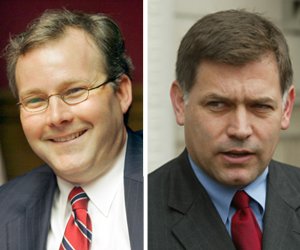WASHINGTON — The Bush administration’s Justice Department’s actions were inappropriately political, but not criminal, when it fired a U.S. attorney in 2006, prosecutors said Wednesday in closing a two-year investigation without filing charges.
The decision closes the books on one of the lingering political disputes of the Bush administration, one that Democrats said was evidence of GOP politics run amok and that Republicans have always said was a manufactured controversy.
The nine prosecutors who were fired were: Daniel Bogden of Nevada, Paul Charlton of Arizona, Margaret Chiara of Michigan, Bud Cummins of Arkansas, Todd Graves of Missouri, Carol Lam of California, John McKay of Washington, Kevin Ryan of California, and David Iglesias of New Mexico.
Cummins was replaced with an interim federal prosecutor, Tim Griffin.
Griffin said Wednesday that he respects the Justice Department’s decision.
Griffin resigned from the post after six months, and now runs a Little Rock law firm and public affairs firm. He is now running against Democratic state Sen. Joyce Elliott for a central Arkansas congressional seat.
Griffin said he was honored to serve in the U.S. attorney post, but said he believed the prosecutor controversy was mishandled by the Justice Department. He declined to elaborate on who he believed mishandled the issue.
“There were a lot of political games being played and I think it could have been handled much better,” Griffin said.
The scandal contributed to the resignation of Attorney General Alberto Gonzales.
Investigators looked into whether the Bush administration improperly dismissed nine U.S. attorneys, and in particular Iglesias, as a way to influence criminal cases. The scandal added to mounting criticism that the administration had politicized the Justice Department, a charge that contributed to the resignation of Attorney General Alberto Gonzales.
In 2008, the Justice Department assigned Nora Dannehy, a career prosecutor from Connecticut with a history of rooting out government wrongdoing, to investigate the firings.
“Evidence did not demonstrate that any prosecutable criminal offense was committed with regard to the removal of David Iglesias,” the Justice Department said in a letter to lawmakers Wednesday. “The investigative team also determined that the evidence did not warrant expanding the scope of the investigation beyond the removal of Iglesias.”
Prosecutors also said there was insufficient evidence to charge someone with lying to Congress or investigators.
Iglesias was fired after the head of New Mexico’s Republican Party complained to the White House that Iglesias was soft on voter fraud. He asked that Iglesias be replaced so that the state could “make some real progress in cleaning up a state notorious for crooked elections.”
Harriet Miers, then White House counsel, told lawmakers that presidential political adviser Rove was “very agitated” over Iglesias “and wanted something done about it.” Rove has said he played no role in deciding which U.S. attorneys were fired, that the firings weren’t politically motivated and that he never sought to influence prosecutions.
Dannehy faulted the Justice Department for firing Iglesias without even bothering to figure out whether complaints about him were true. That indicated “an undue sensitivity to politics on the part of DOJ officials who should answer not to partisan politics but to principles of fairness and justice,” the Justice Department wrote in its letter.
But that was not a crime, and was not an effort to influence prosecutions, the letter said.
